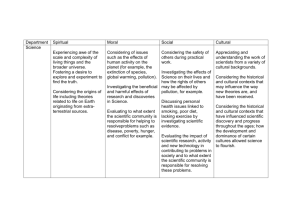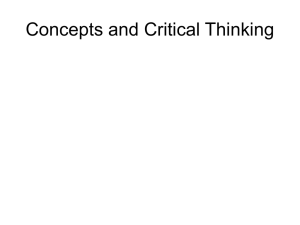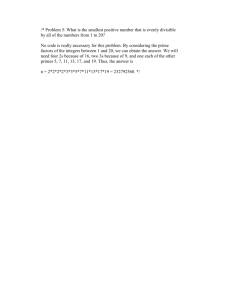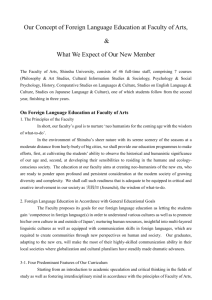Cultivating - Aberdeen Buddhist Group
advertisement
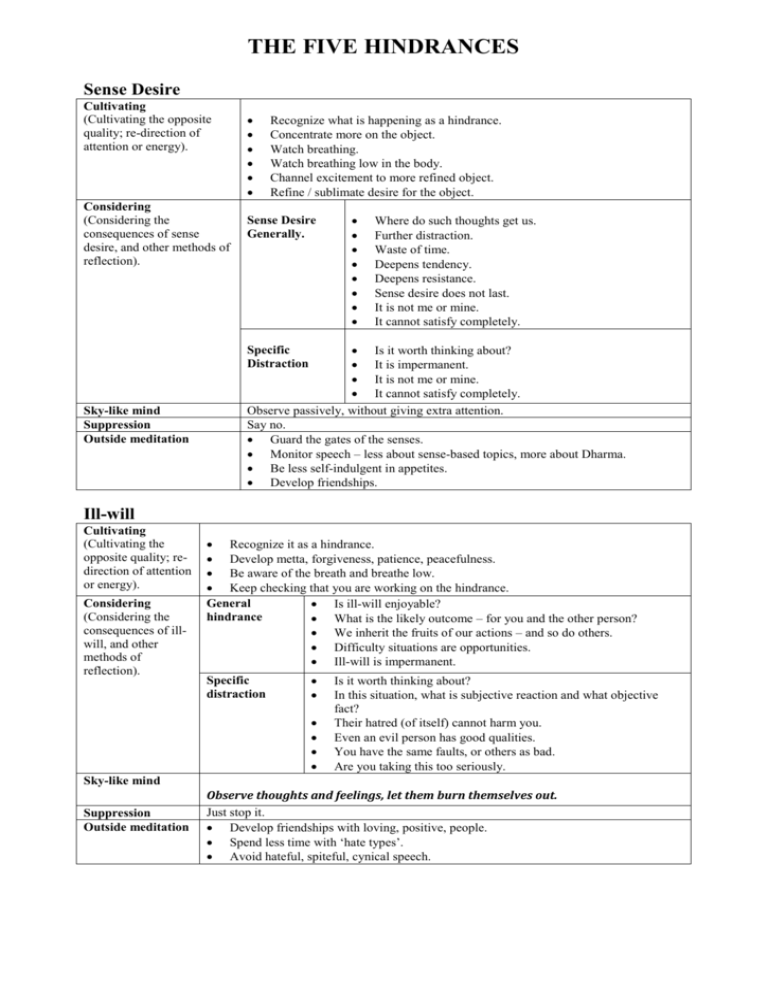
THE FIVE HINDRANCES Sense Desire Cultivating (Cultivating the opposite quality; re-direction of attention or energy). Considering (Considering the consequences of sense desire, and other methods of reflection). Recognize what is happening as a hindrance. Concentrate more on the object. Watch breathing. Watch breathing low in the body. Channel excitement to more refined object. Refine / sublimate desire for the object. Sense Desire Generally. Where do such thoughts get us. Further distraction. Waste of time. Deepens tendency. Deepens resistance. Sense desire does not last. It is not me or mine. It cannot satisfy completely. Is it worth thinking about? It is impermanent. It is not me or mine. It cannot satisfy completely. Observe passively, without giving extra attention. Say no. Guard the gates of the senses. Monitor speech – less about sense-based topics, more about Dharma. Be less self-indulgent in appetites. Develop friendships. Specific Distraction Sky-like mind Suppression Outside meditation Ill-will Cultivating (Cultivating the opposite quality; redirection of attention or energy). Considering (Considering the consequences of illwill, and other methods of reflection). Recognize it as a hindrance. Develop metta, forgiveness, patience, peacefulness. Be aware of the breath and breathe low. Keep checking that you are working on the hindrance. General Is ill-will enjoyable? hindrance What is the likely outcome – for you and the other person? We inherit the fruits of our actions – and so do others. Difficulty situations are opportunities. Ill-will is impermanent. Specific distraction Is it worth thinking about? In this situation, what is subjective reaction and what objective fact? Their hatred (of itself) cannot harm you. Even an evil person has good qualities. You have the same faults, or others as bad. Are you taking this too seriously. Sky-like mind Suppression Outside meditation Observe thoughts and feelings, let them burn themselves out. Just stop it. Develop friendships with loving, positive, people. Spend less time with ‘hate types’. Avoid hateful, spiteful, cynical speech. Sloth & Torpor Cultivating (Cultivating the opposite quality; redirection of attention or energy) Considering (If you can think in this stage). Sky-like mind Suppression Mental Torpor Recognize that this is a hindrance. Decide to engage with the practice. Stimulate energy e.g. through metta. Pay extra attention to the object and try to experience it more vividly. Physical Sloth Recognize it as a hindrance. Keep checking. Have lights on full. Have eyes open. Breathe fresh air. Don’t be too warm. Breathe high – nose or top of head. Pay attention mainly to posture. Physically stimulate yourself – move, change your seat, take breaks. Take a nap. Do some chanting. Visualize bright light in body. Calm down and relax – if sloth is caused by tension. Life is a very precious opportunity. You should use it to the utmost. There is no use for not trying. Consider the energetic qualities of others e.g. the Buddha. Not usually to be recommended. There’s nothing there to suppress! Create some energy instead! Outside meditation Exercise – the right amount and right kind. Food – the right amount and right kind. Avoid passivity and dullness in speech – speak energetically and positively. Spend time with, and emulate, energetic people. Reflect on your motivation. Study the Dharma. Restlessness & Anxiety Cultivating (Cultivating the opposite quality; redirection of attention or energy). Considering Considering the consequences of restlessness and anxiety, and other methods of reflection). Sky – like mind Suppression Outside meditation Recognize this state of mind as a hindrance. Keep checking progress. Make stronger efforts to engage – in a balanced not a tense way. Develop inner contentment. Use a phrase to calm yourself. Breathe low in the body. Pay attention to posture. Resolve to sit very still. Meditate very regularly. You can do nothing about your specific worry at present i.e. when you are meditating. Look for causes for present mental and/or physical state. It is impermanent and dependent. It is unsatisfactory. It is not ‘you’ or in any way your own A good antidote. Just observe what happens. Probably not possible. Do not exercise just before sitting. Exercise can help at other times, though. Develop less hectic lifestyle. Spend time with people possessing dignity, calm and restraint. Avoid useless and frivolous speech. Develop your thinking faculty. Tackle confusion through Dharma study. Understand ethics – see the relationship between cause and effect. Nature of restlessness and anxiety. Sceptical Doubt Cultivating (Cultivating the opposite quality; re-direction of attention or energy). Considering (Considering the consequences of sense desire, and other methods of reflection). Sense Desire Generally. Sky-like mind Suppression Outside meditation Recognize what is happening as a hindrance. Concentrate more on the object. Watch breathing. Watch breathing low in the body. Channel excitement to more refined object. Refine / sublimate desire for the object. Where do such thoughts get us. Further distraction. Waste of time. Deepens tendency. Deepens resistance. Sense desire does not last. It is not me or mine. It cannot satisfy completely. Specific Is it worth thinking about? Distraction It is impermanent. It is not me or mine. It cannot satisfy completely. Observe passively, without giving extra attention. Say no. Guard the gates of the senses. Monitor speech – less about sense-based topics, more about Dharma. Be less self-indulgent in appetites. Develop friendships.


